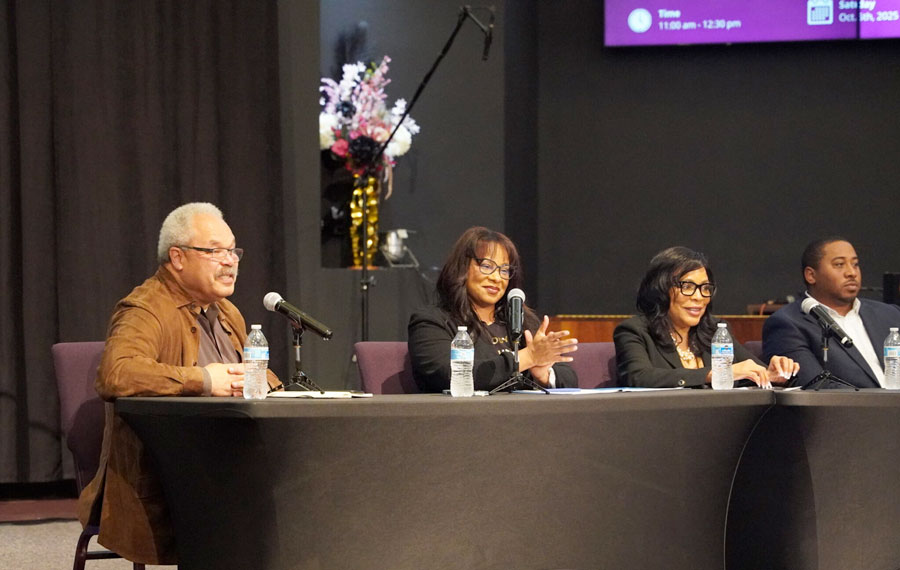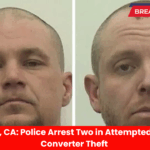PORTLAND, Ore. — At Emmanuel Church in Portland on Saturday, the Rev. Leroy Haynes Jr., a veteran of the Civil Rights Movement, stood before a crowd of about 100 people with a message not of comfort, but of caution.
“We are at a crossroad as a nation, as a state, and as a city,” Haynes said. “There are forces that want to turn back the clock — turn back the clock on what many have died for on the front line.”
The gathering, called the Black Community Town Hall, was organized by the Albina Ministerial Alliance and the Interfaith Peace and Action Collaborative. It brought together Black faith leaders and elected officials to discuss what they described as growing threats to civil rights under President Donald Trump’s policies and a concerning rise in authoritarianism nationwide.
Also Read
Haynes, who once worked with Civil Rights leaders such as the late Congressman John Lewis, urged attendees to transform frustration into action. “We must move from a moment to a movement,” he said. “If we drop the ball again, we’ll enter another Reconstruction period of losing our human rights and civil rights.”
Joining Haynes were several prominent Democratic leaders, including U.S. Rep. Janelle Bynum, Oregon’s first Black member of Congress; State Sen. Lew Frederick; Portland City Councilor Loretta Smith; and Multnomah County Commissioner Vince Jones-Dixon. Members of the Portland NAACP, city officials, and Oregon Secretary of State Tobias Read also attended.
The speakers criticized what they described as harsh federal actions against immigrants and people of color — including efforts to cut food and medical aid, deploy troops to U.S. cities, and expand immigration enforcement that has reportedly detained citizens without cause.
Frederick and Jones-Dixon shared firsthand accounts of fear among Latino residents. Frederick said a Latina student in his neighborhood was afraid to go to school, while Jones-Dixon described witnessing an aggressive immigration operation in Gresham that was so large it shut down a nearby school. “When I arrived on the scene, all I saw was fear,” Jones-Dixon said. “Then when they saw us, there was hope — because they had a connection and could get answers.”
Congresswoman Bynum, speaking at her 21st town hall this year, encouraged attendees to stay politically active, especially young voters. She emphasized the importance of holding leaders accountable and not giving in to despair. Despite Trump’s attempts to cut funding for social programs, she said, federal courts have repeatedly blocked many of his administration’s actions.
“While the president has a lot of commotion going on, what we’ve been saying is: ‘Run us our money,’” Bynum said, referring to federal funds owed to Oregon for education, healthcare, and clean energy programs.
Councilor Loretta Smith echoed her support, urging Bynum and other Democrats in Congress to stand firm on federal funding negotiations. “Stay out as long as you can,” Smith said. “We need those food stamps, that healthcare, those jobs.”
During the town hall’s Q&A session, Mary Beth Miller, a Republican legislative staffer, challenged the panel with questions about immigration reform and economic issues, asking whether bipartisan cooperation could create safer communities and better opportunities.
Frederick responded by pointing to what he described as Republican silence on immigration enforcement tactics in Oregon — including masked agents, unmarked vehicles, and detentions of U.S. citizens. “I have yet to see any Republican leader step forward and condemn the kind of things ICE has been doing,” he said. “Until that happens, don’t tell me how much you care.”
As the event concluded, Haynes urged unity across generations and communities. “The struggle for justice never ends,” he said. “It’s passed from one generation to the next. The question is — will we carry the torch forward?”












